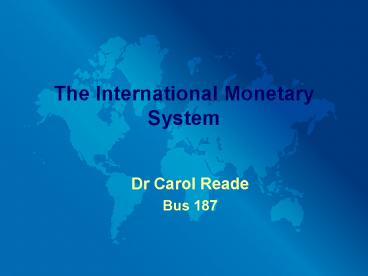The International Monetary System PowerPoint PPT Presentation
1 / 22
Title: The International Monetary System
1
The International Monetary System
- Dr Carol Reade
- Bus 187
2
Learning Objectives
- Understand the evolution and functioning of the
international monetary system. - Explore the debate on fixed versus floating
exchange rates. - Evaluate the role of the World Bank and IMF
- Assess the implications of the international
monetary system for the practice of international
business.
3
Introduction
- The international monetary system refers to the
institutional arrangements that countries adopt
to govern exchange rates. - institutional arrangements government
intervention in the foreign exchange markets
4
Evolution of the International Monetary System
- Gold standard
- Fixed exchange rates
- Floating exchange rates
- Managed-float or dirty-float system
5
The Gold Standard
- Roots in old mercantile trade
- Inconvenient to ship gold, changed to paper-
redeemable for gold - Want to achieve balance-of-trade equilibrium
Trade
USA
Japan
Gold
6
Bretton Woods
- In 1944, 44 countries met in Bretton Woods, New
Hampshire - Key Components of the Agreement
- Established a fixed exchange rate system
- Created the World Bank and the International
Monetary Fund - Plus
- Agreed not to engage in competitive devaluations
for trade purposes and defend their currencies
7
Fixed Exchange Rate System
- Fixed exchange rate occurs when a set of
currencies are fixed against each other at some
mutually agreed upon exchange rate
8
Collapse of the Fixed Exchange System
- The system of fixed exchange rates established at
Bretton Woods worked well until the late 1960s - The US dollar was the only currency that could be
converted into gold - The US dollar served as the reference point for
all other currencies - Any pressure to devalue the dollar would cause
problems throughout the world
9
The Floating Exchange Rate
- Floating exchange rates occur when the foreign
exchange market determines the relative value of
a currency - The worlds four major currencies dollar, euro,
yen, and pound are all free to float against
each other
10
Exchange Rates Since 1973
- Since 1973, exchange rates have become more
volatile and less predictable than they were
between 1945 and 1973, due to - Oil crisis -1971
- Loss of confidence in the dollar - 1977-78
- Oil crisis 1979, OPEC increases price of oil
- Unexpected rise in the dollar - 1980-85
- Rapid fall of the dollar - 1985-87 and 1993-95
- Partial collapse of European Monetary System -
1992 - Asian currency crisis - 1997
11
Exchange Rates Since 1973
- Figure 10.1 Major Currencies Dollar Index,
1973-2006
12
Fixed vs. Floating Exchange Rates
- The merits of each continue to be debated
- There is no agreement as to which system is
better - Many countries today are disappointed with the
floating exchange rate system
13
Exchange Rate Regimes
- IMF Members, 2006
14
Role of the World Bank and IMF
- The agreement reached at Bretton Woods
established two multinational institutionsthe
World Bank and the International Monetary Fund
(IMF). - Since WWII, both institutions have played an
important role in the world economy.
15
Role of the World Bank
- Official name International Bank for
Reconstruction and Development - Purpose To fund Europes reconstruction and help
3rd world countries. - Overshadowed by Marshall Plan, so it turns
towards development - Lending money raised through WB bond sales
- Agriculture
- Education
- Population control
- Urban development
16
Role of the IMF
- The role of the IMF is to maintain order in the
international monetary system - (1) to avoid a repetition of the competitive
devaluations of the 1930s, and - (2) to control price inflation by imposing
monetary discipline on countries.
17
Video Discussion
- The IMF has come under considerable fire from
those who believe that its actions target the
poor. - What would happen to the poor in these nations if
the IMF had not stepped in?
18
Evaluating the IMF Policy Prescriptions
- Critics worry about
- Inappropriate policies
- The IMFs one-size-fits-all approach to
macroeconomic policy is inappropriate for many
countries - Moral hazard
- People behave recklessly when they know they will
be saved if things go wrong - Lack of Accountability
- The IMF has become too powerful for an
institution that lacks any real mechanism for
accountability
19
Implications For Managers
- For managers, understanding the international
monetary system is important for - currency management
- business strategy
- corporate-government relations
20
Currency Management
- Managers must recognize that the current
international monetary system is a managed float
system in which government intervention can help
drive the foreign exchange market - Under the present system, speculative buying and
selling of currencies can create volatile
movements in exchange rates
21
Business Strategy
- Managers need to recognize that while exchange
rate movements are difficult to predict, their
movement can have a major impact on the
competitive position of businesses - To contend with this situation, managers need
strategic flexibility - Eg., dispersing production to different locations
22
Corporate-Government Relations
- Managers need to recognize that businesses can
influence government policy towards the
international monetary system - Companies should promote an international
monetary system that facilitates international
growth and development

